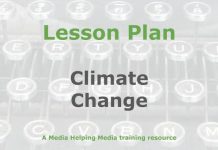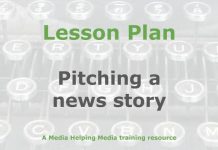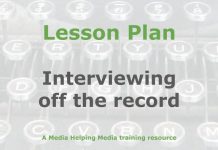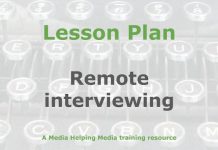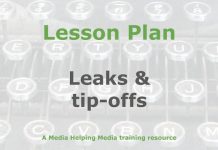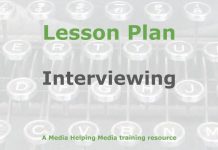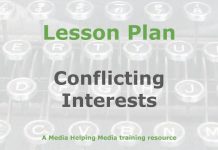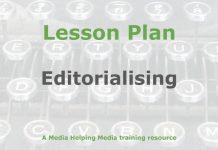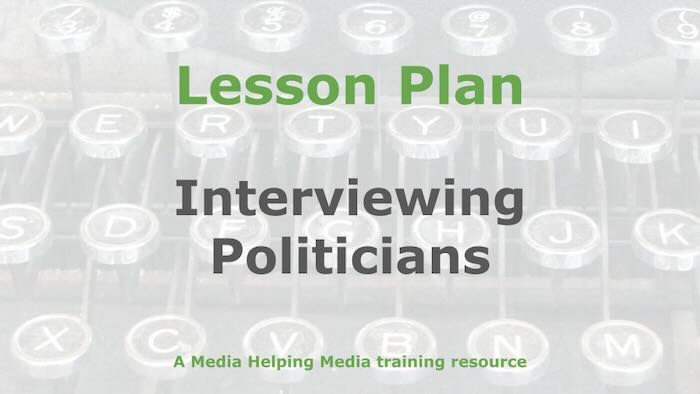 This lesson plan is designed to help journalism students interview politicians in order to uncover answers that inform the audience.
This lesson plan is designed to help journalism students interview politicians in order to uncover answers that inform the audience.
It’s based on the article How to interview politicians which is published on Media Helping Media. We suggest you read the article before adapting the lesson outline for your own purposes.
For those trainers who are intending to adapt the lesson below for your own purposes we have a training timetable template which you can use to schedule the sessions. It’s also attached to the bottom of this page.
Learning objective
Students will critically analyse the underlying issues when interviewing politicians, identifying biases and ensuring factual accuracy. They will evaluate the effectiveness of their questions in eliciting informative responses.
- Student-facing objective: By the end of this lesson the student will be able to spot biases and ask questions that seek to elicit clear, accurate answers from politicians.
- Standards: The journalist will better understand the underlying issues that need to be recognised when interviewing politicians.
Learning activities
Warm-up
Notice and wonder: Display a short video clip or audio excerpt of a politician speaking on a current issue. Ask students, “What do you notice? What do you wonder?” Give them a few minutes to jot down observations and questions. Pair students to share their thoughts. Then, select a few students to share with the class. Record their insights and questions on the board. This primes students to think critically about political communication and prepares them for deeper analysis in the lesson.
Direct instruction
- Conceptual understanding: Begin with a discussion on the role of journalists in political interviews. Ask students to define the purpose of interviewing politicians. Highlight the importance of uncovering biases and ensuring factual accuracy. Use real-world examples of interviews where biases were evident or facts were misrepresented. Encourage students to identify these elements in the examples provided.
- Procedural skills and fluency: Introduce a framework for crafting effective interview questions. Explain the difference between open-ended and closed-ended questions. Provide examples of each type and discuss their potential impact on the interview. Have students practice rewriting closed-ended questions into open-ended ones, focusing on eliciting more informative responses.
- Application: Present a scenario where students must prepare questions for a mock interview with a politician on a specific issue (e.g., climate change policy). Divide students into small groups to brainstorm and draft questions. Emphasise the need for questions that are unbiased and factually grounded. After drafting, have each group share their questions with the class for feedback and refinement.
Guided practice
Think, Pair, Share: Guide students through a structured practice session.
- Think: Begin by presenting a brief transcript of a political interview. Ask students to individually identify potential biases and inaccuracies in the questions or responses.
- Pair: Have students pair up to discuss their findings, encouraging them to compare their observations and refine their analysis.
- Share: Facilitate a class discussion where pairs share their insights. Encourage students to critique and build upon each other’s observations, focusing on how the questions could be improved for clarity and accuracy.
- Feedback: Provide targeted feedback on their analyses, highlighting strong points and areas for improvement.
- Reflection: Conclude with a reflective question: “How can we ensure our questions are both unbiased and factually accurate?” Encourage students to write a brief response, synthesising their learning from the activity.
Independent practice
- Exercise: Direct students to complete an exercise where they analyse a provided transcript of a political interview. Instruct them to identify and annotate instances of bias, inaccuracies, and effective questioning techniques.
- Observation: Circulate the classroom, observing students’ work. Offer guidance and support as needed, ensuring students are accurately identifying key elements.
- Peer review: Have students exchange their annotated transcripts with a peer. Each student should review their partner’s work, providing constructive feedback on the identification of biases and the effectiveness of the questions.
- Revision: Allow time for students to revise their annotations based on peer feedback, reinforcing their understanding of unbiased and factually accurate questioning.
Assignment
Ask students to answer these questions:
- What is one strategy you learned today for identifying bias in political interviews?
- How can you ensure your questions are factually accurate when interviewing a politician?
- What’s one question you still have from today’s lesson?
Here are some suggested answers:
- Suggested answer to Question 1: Look for language that suggests opinion rather than fact, and check for any assumptions in the questions.
- Suggested answer to Question 2: Research the topic thoroughly and cross-check facts from multiple reliable sources.
Teacher resources
Differentiation guide
Advanced learners: Encourage deeper analysis by having students research a politician’s past interviews. Task them with identifying patterns in questioning and responses, focusing on how these influence public perception. Challenge them to create a set of questions that could reveal new insights or challenge the politician’s narrative.
Striving learners: Simplify the task by providing a list of common biases and inaccuracies to look for in political interviews. Offer sentence starters for crafting questions. Pair them with peers for collaborative question development, ensuring they receive support and feedback throughout the process.
Background reading: We recommend you read the article How to interview politicians before adapting the lesson outline for your own purposes.
Notable definitions
- Bias: A tendency to present information in a way that reflects a particular perspective or agenda, rather than being neutral or objective. Recognising bias is crucial for journalists to ensure balanced reporting.
- Fact-checking: The process of verifying information to ensure its accuracy and truthfulness. This is essential in journalism to maintain credibility and trustworthiness.
- Open-ended questions: Questions designed to encourage a full, meaningful answer using the subject’s own knowledge or feelings. These questions are crucial in interviews to elicit detailed and informative responses from politicians.
Required materials
- Video/audio clip of a politician speaking on a current issue
- Whiteboard and markers for recording student insights
- Printed transcripts of political interviews for analysis
- Exercise handouts with interview transcripts for independent practice
- Peer review forms for feedback exchange
- Access to computers or tablets for research and fact-checking (optional)
Lesson summary
- Warm-up
- Direct instruction
- Guided practice
- Independent practice
- Assignment
Related material
